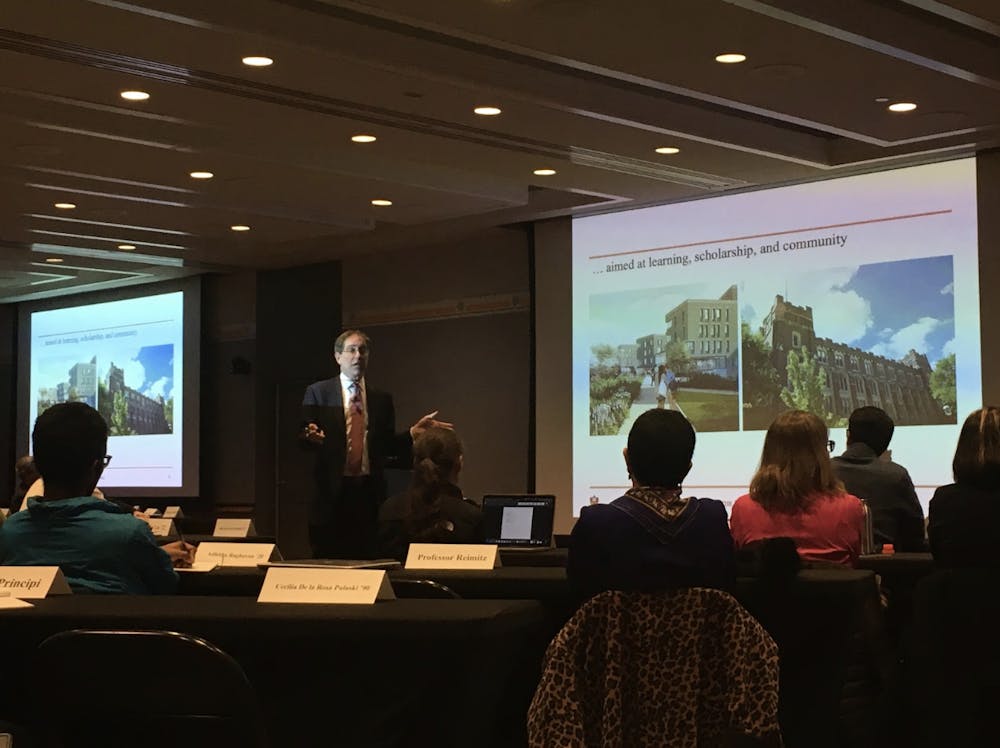In its Feb. 10 meeting, the Council of the Princeton University Community (CPUC) heard brief presentations from Provost Deborah Prentice on the University’s budget and President Christopher L. Eisgruber ’83, who reiterated the content of his annual “State of the University” letter. This was followed by a lengthy Q&A in which Eisgruber fielded questions from the University community on Title IX concerns, construction plans, and divestment, among other topics.
Prentice summarized the current operating budget of the University, emphasizing that 60 percent of the University’s income comes from its investment portfolio, managed by PRINCO. She also stated that the budgetary allotment to student financial aid currently exceeds the amount earned yearly from student tuition, room, board, and fees.
Eisgruber also spoke at length on the contents of his “State of the University” letter, describing plans for University renovations and construction in the years to come, such as the building of several new academic buildings east of Washington Road, the demolition of Wilson College, and the construction of Perelman College.
“We’ve already broken ground on the two new res[idential] colleges,” Eisgruber said.
In regards to University development plans, audience members asked about the plans for Lake Campus, integration of the E-Quad with the rest of campus, and plans to redesign McCosh Health Center with a focus on a positive environment and space for student healing.
According to Eisgruber, the Lake Campus south of Lake Carnegie will likely house athletic facilities, graduate student housing, and additional convening spaces, with the potential for shuttle service support to connect the new facilities with the main campus to the north.
After Eisgruber’s presentation, the floor was opened up to audience questions.
A student from Princeton IX Now, a student advocacy group “working to end sexual and interpersonal violence at Princeton,” asked what actions are being taken by the University to address students’ Title IX concerns. This comes after the nine days of student protests that took place last May, and the joint committee reports on University Title IX policy released on Oct. 24.

“I was disappointed to see in your letter of priorities that the issue of sexual violence and interpersonal violence didn’t make the cut,” the student said.
The student asked for information on the current status of Title IX recommendations, a potential fund for student mental health treatment, and a redesign for student violence prevention training.
Eisgruber and Vice President for Campus Life Rochelle Calhoun explained that “conversations” are ongoing regarding Title IX reform. Calhoun stated that the newly formed CPUC Subcommittee on Sexual Climate, Culture, and Conduct will hopefully have its first meeting “by the end of this month.”
“We’ve had some conversations [regarding student training],” Calhoun said. “I have to say that that’s one of the areas where we have to do a little more work.”

The pair also suggested that it may be difficult to align University policy with what students have advocated for in recent months.
“I agree with you that the level of sexual violence in our society and a lot of university campuses and on our campus is a tragedy,” Eisgruber said.
However, he noted that the U.S. Department of Education may soon adopt Title IX regulations that prove to be “inconsistent” with ideal University policy on the issue.
Another major topic of conversation between the CPUC and audience members was divestment, given that over 700 alumni and students have pledged not to donate to the University until it divests from fossil fuel companies.
“No,” said Eisgruber, when asked if the University has any future plans for divestment. “The answer is right now, we do not have any such plans. … We make a difference in the world through our teaching and research and the quality of that teaching and research, rather than by taking a symbolic stance with our endowment.”
Graduate student Micah Fletcher of Divest Princeton urged the president to reconsider this position, arguing that a small number of corporations are responsible for a majority of global emissions and that investment in such companies is therefore immoral.
Fletcher argued that the topic of divestment is particularly important, given that fossil fuel firms contribute to climate denialism, peer institutions have already committed to divestment, and the University is committed to net zero carbon emissions by 2046.
“Why then,“ Fletcher asked, “hasn’t Princeton committed to divesting its endowment from fossil fuel firms and reinvesting in sustainable assets?”
Eisgruber expressed a contrasting opinion on the role of those corporations in the climate crisis.
“I think it is, in my view, not accurate to say that this is happening because of these big companies that are somehow doing it to us. They’re responding to a set of preferences that people have and act upon.”
The next CPUC meeting will take place on March 23, 2020, at 4:30 p.m.








